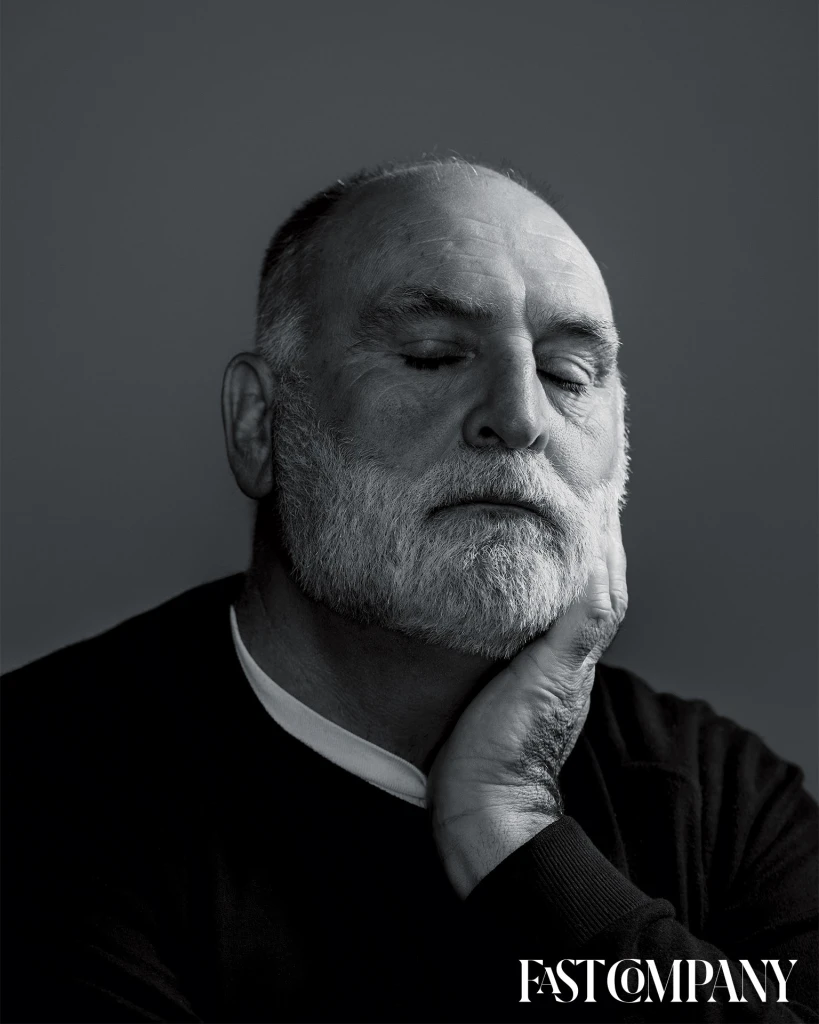This story is part of a special series celebrating the 10th anniversary of the Fast Company Innovation Festival.
Through his more than three dozen restaurants, various TV series and specials, and podcast, Spanish-born chef José Andrés has popularized paella and introduced Americans to jamón ibérico. But his impact goes far beyond cuisine. Andrés’s 14-year-old nonprofit, World Central Kitchen, has emerged over the past decade as one of the world’s leading food-aid organizations because of its unique ability to respond nimbly to all manner of humanitarian crises—from natural disasters to war. WCK harnesses local networks of chefs, waitstaffs, restaurants, and food warehouses to quickly make and distribute meals, with an emphasis on culturally relevant offerings (tahina and za’atar in Gaza; Easter cakes in Ukraine).
To date, the nonprofit has served more than 400 million meals, with Andrés’s own presence at the scene of a calamity—often wearing his signature utility vest—helping to mobilize volunteers and elicit donations from around the globe. He leans skillfully on politicians and other policymakers to get his aid flowing, as when he managed to get a cargo ship full of food into Gaza earlier this year ahead of even the United Nations. The next month, seven WCK aid workers were killed in Israeli air strikes, demonstrating the risks of such an undertaking. (“There is no excuse for these killings, none,” he said at a memorial service for them.) Yet Andrés presses on. “Food will always be found,” he says. “Helpers, they’re around every corner.” Here’s what he has to say about his work:
What World Central Kitchen did was give people the opportunity to help, to bring them together with a simple mission: Let’s feed as many people as quickly as we can. That’s the main innovation—just tapping the limitless potential of human empathy.
I watched what happened during Hurricane Katrina [in 2005], how we were not able to respond. Tens of thousands of Americans gathered in the Superdome, and we didn’t have the mechanism to just bring them food and water. I thought: How is it possible that in an arena full of food stands, we aren’t able to start feeding people immediately? There’s always a food warehouse somewhere. Everybody’s in the food business. You only have to say “Who wants to help?” and everybody’s going to raise their hand. So that idea took hold. When the 2010 earthquake happened in Haiti, I went there with the intention to learn. I ended up bringing tens of thousands of meals to different camps. That’s when World Central Kitchen was born.

[Today] when people see one shirt, one flag from World Central Kitchen, the community will join the effort. We’ve seen this in smaller events, like [the Maui wildfire in 2023]. Hawaiians took care of Hawaiians, but World Central Kitchen became the flag that brought all of them together. That’s why we put our logos [everywhere]. It’s a call to action to create a team.
In Ukraine, in the early days [of the war], there were just two people with World Central Kitchen inside the country. But we were able to find amazing Ukrainians, amazing organizations that brought with them hundreds of people. Before we knew it, we were in every major city. We were responding to bombings, to shellings. We’ve now reached over 250 million meals [there], a million meals a day. The same thing happened in Israel: We began partnering with all the communities in the kibbutzim that were attacked. And in Gaza, we created a network of community kitchens that were, at one time, doing more than 400,000 meals a day.